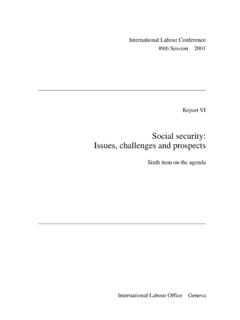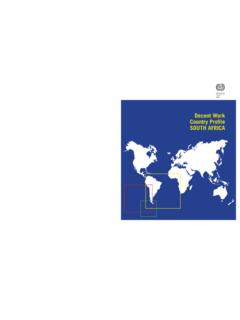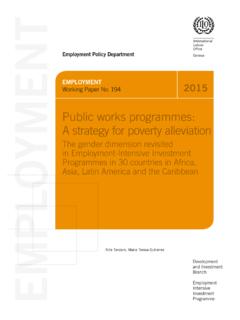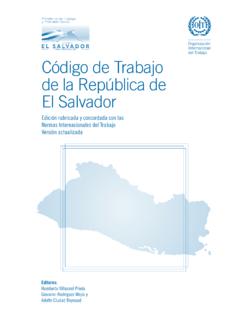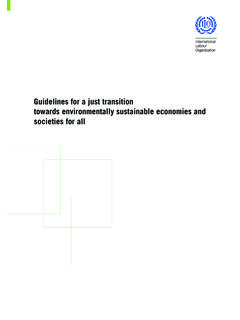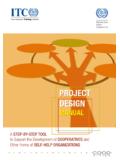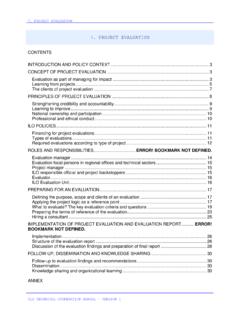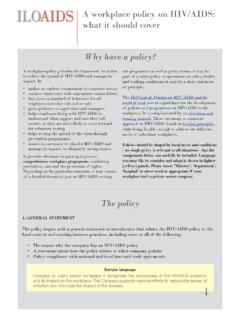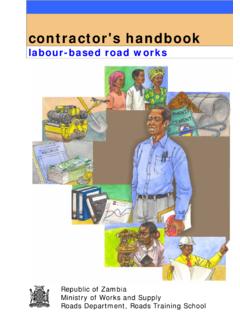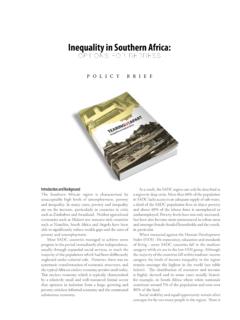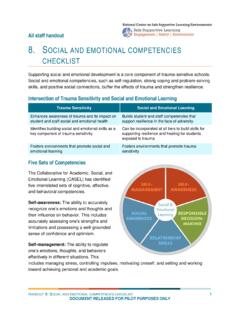Transcription of The future of work in the automotive industry: The need to ...
1 TMFWAI/2021 The future of work in theautomotive industry: The need to invest in people scapabilities and decentand sustainable workIssues paper for the Technical Meeting on the future of Work in the automotive Industry (Geneva, 15 19 February 2021) Sectoral Policies Department Geneva, 2020 Copyright International Labour Organization 2020 First edition 2020 Publications of the International Labour Office enjoy copyright under Protocol 2 of the Universal Copyright Convention. Nevertheless, short excerpts from them may be reproduced without authorization, on condition that the source is indicated.
2 For rights of reproduction or translation, application should be made to ILO Publications (Rights and Licensing), International Labour Office, CH-1211 Geneva 22, Switzerland, or by email: The International Labour Office welcomes such applications. Libraries, institutions and other users registered with a reproduction rights organization may make copies in accordance with the licences issued to them for this purpose. Visit to find the reproduction rights organization in your country. The future of work in the automotive industry: The need to invest in people s capabilities and decent and sustainable work, Issues paper for the Technical Meeting on the future of Work in the automotive Industry (Geneva, 15 19 February 2021), International Labour Office, Sectoral Policies Department, Geneva, ILO, 2020.
3 ISBN 978-92-2-031863-8 (print) ISBN 978-92-2-031864-5 (Web pdf) Also available in French: L avenir du travail dans le secteur automobile: La n cessit d investir dans le potentiel humain et dans le travail d cent et durable, document d orientation pour la R union technique sur l avenir du travail dans le secteur automobile (Gen ve, 15-19 f vrier 2021), ISBN 978-92-2-032116-4 (print), ISBN 978-92-2-032117-1 (Web pdf), Geneva, 2020; and in Spanish: El futuro del trabajo en la industria automotriz y la necesidad de invertir en la capacidad de las personas y el trabajo decente y sostenible, documento tem tico para la Reuni n t cnica sobre el futuro del trabajo en la industria automotriz (Ginebra, 15-19 de febrero de 2021), ISBN 978-92-2-032118-8 (print), ISBN 978-92-2-032119-5 (Web pdf), Geneva, 2020.
4 ILO Cataloguing in Publication Data The designations employed in ILO publications, which are in conformity with United Nations practice, and the presentation of material therein do not imply the expression of any opinion whatsoever on the part of the International Labour Office concerning the legal status of any country, area or territory or of its authorities, or concerning the delimitation of its frontiers. The responsibility for opinions expressed in signed articles, studies and other contributions rests solely with their authors, and publication does not constitute an endorsement by the International Labour Office of the opinions expressed in them.
5 Reference to names of firms and commercial products and processes does not imply their endorsement by the International Labour Office, and any failure to mention a particular firm, commercial product or process is not a sign of disapproval. Information on ILO publications and digital products can be found at: Printed by the International Labour Office, Geneva, Switzerland iii Contents Page Background .. 1 1. The automotive industry .. 3 Definition and structure .. 4 Global motor vehicle production .. 6 Global motor vehicle sales .. 8 Contribution to Gross Domestic Product and world trade.
6 11 Global 12 The automotive industry at a turning point .. 15 2. Megatrends and drivers of change .. 16 Technological advances .. 16 Advanced manufacturing .. 16 Digitalization in the automotive value chain .. 18 New products and materials .. 19 Globalization .. 21 Demographics .. 23 Climate change .. 25 3. Challenges and opportunities for decent and sustainable work .. 27 Employment .. 27 Job losses .. 28 Job transformation .. 29 Job creation .. 30 Skills and lifelong learning .. 33 future demand for skills .. 33 The building blocks of skills development and lifelong learning.
7 35 Gender equality at the heart of skills development .. 38 Coordinated policies and action for lifelong learning .. 39 Investing in lifelong learning .. 40 social protection and conditions of work .. 42 social protection .. 42 Changes in work organization .. 43 Working-time arrangements .. 44 Migrant workers .. 45 Occupational safety and health .. 47 Fundamental principles and rights at work .. 48 social dialogue .. 49 1 Background At its 335th Session (March 2019), the Governing Body of the ILO decided to convene a technical meeting on the future of work in the automotive industry and the need to invest in people s capabilities and decent and sustainable work.
8 1 At its 337th Session (October November 2019), the Governing Body in turn decided that the technical meeting should take place in Geneva on 4 8 May 2020. 2 In the context of the ILO Centenary Declaration for the future of Work, 3 the meeting will discuss future needs for skills and vocational education and training in the automotive industry. With regard to the composition of the meeting, the Governing Body decided to invite all governments, eight Worker representatives and eight Employer representatives, appointed on the basis of nominations made by the respective groups of the Governing Body.
9 Selected official international organizations and international non-governmental organizations were to be invited as observers. This issues paper has been prepared by the International Labour Office as a basis for discussions at the meeting. Chapter 1 contains a brief overview of the automotive industry today in terms of its structure; vehicle production and sales; and contribution to gross domestic product (GDP), world trade and employment. Chapter 2 sets out the megatrends and drivers of change that will transform the industry in the future , with a focus on technological advances, globalization, demographics and climate change.
10 Chapter 3 describes the challenges and opportunities for decent and sustainable work in terms of employment; skills and lifelong learning; social protection and conditions of work; fundamental principles and rights at work; and social dialogue . The issues paper addresses the challenges and opportunities that the automotive industry faces in the context of the Centenary Declaration, in which the Conference declared that, in further developing its human-centred approach to the future of work, the ILO must direct its efforts to: (i) ensuring a just transition to a future of work that contributes to sustainable development in its economic, social and environmental dimensions.
